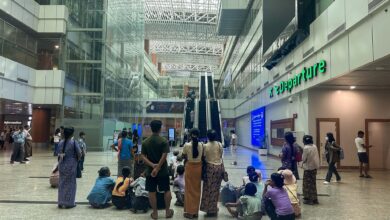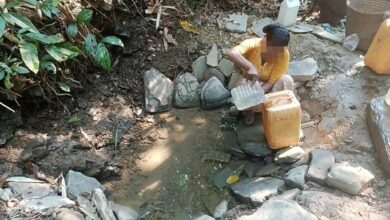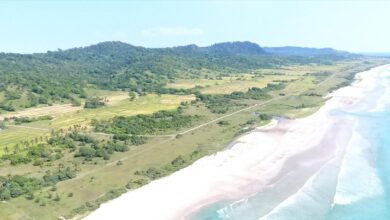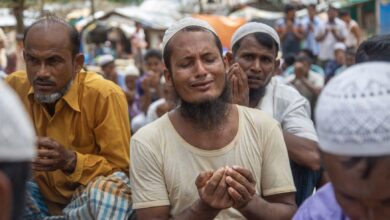
I come from a family of Kachin independence Army (KIA) soldiers. My grandfather fought, my uncle died on the front line, and my dad served as well, up until the ceasefire in 1994. I was born a year later, so I have no memories of him serving, but I do have vivid memories of him getting drunk every night, beating my mom, and sometimes beating my siblings and me, too. There were ten of us—eight brothers, one sister, and me, but two of my brothers passed away from illnesses, so now I’m the oldest.
I grew up poor. My dad wanted to take me and my siblings out of school so that we could work in the field, but my mom refused. She opened a shop and she also collected empty cans, bottles, paper boxes, and iron to sell so that we could continue our studies. On my way to and from school, I always looked for pieces of iron so that I could help her. It was a very difficult time, and no one supported us, not even our church community or our neighbours. Those are my childhood memories.
I finished high school in 2011, not knowing it was to be the end of my education. Months later, war resumed between the KIA and the military. I could hear gunfire and explosions from my village, and soon, displaced people started arriving from nearby areas. It was an intense time, and the KIA was asking people to serve on the frontline. I thought about joining, but my parents didn’t agree, so I volunteered to distribute food at a camp for internally displaced persons (IDPs) in the border town of Mai Ja Yang instead. Most were old people, kids, or pregnant women, and I saw that there wasn’t enough food to go around.
In 2012, a relative asked me if I wanted to go to Malaysia. I said, “Why not?” I couldn’t study or stay at home because of the war, and I thought that maybe I could help my family if I went. At the time, I was 17.
I walked through the jungle at night and crossed the border illegally. Luckily, I didn’t get caught, but I had only been in Kuala Lumpur for a few months when the police stopped me and some friends on the street and demanded to see some identification. At the time, my only ID was a piece of paper from a Kachin community organisation, but the police just ripped it up. They told us to sit down, then they kicked us and took our money before letting us go.
Not long after this, I was recognised by the UN refugee agency (UNHCR) as an asylum seeker. But I’m still regarded as an “illegal immigrant” under Malaysian law. I’ve spent the past decade working 10- to 12-hour shifts in restaurants where I’m treated as inferior to my Malaysian co-workers and paid less, but because I need to support myself and send money home, I just keep going.
In 2012, a relative asked me if I wanted to go to Malaysia. I said, “Why not?” I couldn’t study or stay at home because of the war, and I thought that maybe I could help my family if I went. At the time, I was 17
As difficult as this life has been, my second and third brothers joined me here a few years after I arrived. The development gains brought by the Aung San Suu Kyi-led government and its pledge to make peace “the first priority” hadn’t made much of a difference in Mansi Township, where I’m from. The war continued and anyone could be caught up in the violence. Around 2016, a cousin I grew up with disappeared at the age of 19. I heard that the military accused him of belonging to the KIA, but his body was never found and the case was never brought to justice. Then in 2018, two IDPs from my township were taken into military custody; locals later found their bodies with gunshot wounds to the head. The military said the two men were KIA soldiers who died in battle, but locals told human rights investigators they were civilians who were tortured and murdered.
So my two brothers and I stayed in Malaysia, and after the coup, we decided to bring two more of our brothers here too. The military was killing and torturing people across the country, and in my township, fresh clashes were breaking out between the military and the KIA.

For my family, daily survival had become even harder. My mother had to give up on her two-decade struggle to put all of her kids through school, and my siblings just passed their days on the farm. We were especially worried about my two teenage brothers, as it was only a matter of time before they were sent to fight on the frontline.
So the three of us in Malaysia worked and saved our money, and in October paid an agent 4,000 Malaysian ringgit ($850) to bring them here. We were supposed to pay another 8,000 ringgit when they arrived, but they never did. Our last conversation was on October 26. I had thought they would reach Kuala Lumpur the next morning, but when I tried calling, I couldn’t reach them. My fears were confirmed when I searched online and found a statement from the Malaysian immigration department that police had “successfully busted a human smuggling syndicate” in the border state of Kelantan and detained 49 “illegal aliens.”
I reported to the UNHCR that my brothers were missing, but they just told me to fill out an online form and wait for a call that never came. Refugee community organisations haven’t been able to do much either. One replied: “I’m not sure if your brothers will be sent back to Myanmar, but I’m sure that they will be traumatised and mentally broken.”
My friends who have spent time in immigration detention told me that it is so crowded you can’t even sleep flat on your back. This July, the Malaysian government announced that 298 people had died in its immigration detention centres over the past two years. And last month, Malaysia deported 150 Myanmar nationals, some of whom had sought asylum in the country.
When I think about our situation, I feel very hollow. My brothers are locked in detention, but I feel like I’m in a prison, too. My church leaders say to pray and have faith, but it just leaves me with more unanswered questions. I want to know why we had to run away from our own country and who will take responsibility for what happened to my brothers. I want to know why our lives seem to have no value, whether we are in our homeland or in a foreign country.

I know that the Myanmar military is the root cause of these problems, and that we need to eradicate it to achieve peace and develop as a society. But I also want to see our revolutionary leaders do more to fulfil the trust we have placed in them and honour the sacrifices that the people have made. The KIA is one of the country’s oldest and strongest armed groups. Our leaders still ask us, “Don’t you love your people? Don’t you love your religion or your state?” And they ask if we can go to the frontline for our freedom and democracy. I want freedom and democracy as much as anyone, but as someone who has never experienced either, I feel trapped. I feel that, because my brothers and I were born underprivileged, we are unjustly paying the price of a war that has been going on for more than 62 years.
This war has broken families and deprived a generation of young people of our education and our futures. Countless KIA soldiers have given their lives on the frontline, and countless innocent civilians have died without justice. Tens of thousands of people have been living in IDP camps for more than a decade. Thousands of others, like me, are living without documents in foreign countries, working day and night just to get by. While a small number of elites continue to go about their businesses and send their children to university abroad, most of us have never known such privileges, or even our basic human rights. We need to talk about all of this, too.
This war has broken families and deprived a generation of young people of our education and our futures
At this critical time, we need to defeat our enemy, but we also need to look within. If we ignore or normalise our shortcomings and our mistakes, we will experience the same problems over and over again, and never escape from this loop. As we continue in our war against the junta, we must also sincerely confront our weaknesses and strive to improve ourselves. Our leaders need to stand with the oppressed, bring us together across diversity, and exemplify the ideals of equality, justice and integrity for which they ask us to fight. And all of us need to consider our goals and live by our highest values. Only then can we win and rebuild our beloved nation for the benefit of future generations.
As told to Emily Fishbein



